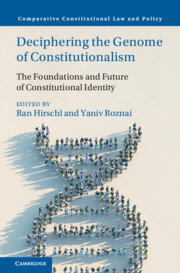Book contents
- Deciphering the Genome of Constitutionalism
- Comparative Constitutional Law and Policy
- Deciphering the Genome of Constitutionalism
- Copyright page
- Contents
- Figures
- Contributors
- Preface
- Acknowledgments
- Introduction
- Part I Foundations, Theory, and Concepts
- 1 Rousseau’s Sovereignty and the Concept of Constitutional Identity
- 2 Constitutional Identity
- 3 Constitutional Identity as Discourse
- 4 Constitutional Identity and Constitutional Revolution
- 5 The Death of Constituent Power
- 6 Constitutional Identity as a Source of Ontological Security
- 7 The Crisis in, and of, Constitutional Identity
- Part II Comparative Perspectives
- Part III American Constitutionalism and Constitutional Identity
- Part IV Emerging Trends
- Index
- References
6 - Constitutional Identity as a Source of Ontological Security
from Part I - Foundations, Theory, and Concepts
Published online by Cambridge University Press: 14 March 2024
- Deciphering the Genome of Constitutionalism
- Comparative Constitutional Law and Policy
- Deciphering the Genome of Constitutionalism
- Copyright page
- Contents
- Figures
- Contributors
- Preface
- Acknowledgments
- Introduction
- Part I Foundations, Theory, and Concepts
- 1 Rousseau’s Sovereignty and the Concept of Constitutional Identity
- 2 Constitutional Identity
- 3 Constitutional Identity as Discourse
- 4 Constitutional Identity and Constitutional Revolution
- 5 The Death of Constituent Power
- 6 Constitutional Identity as a Source of Ontological Security
- 7 The Crisis in, and of, Constitutional Identity
- Part II Comparative Perspectives
- Part III American Constitutionalism and Constitutional Identity
- Part IV Emerging Trends
- Index
- References
Summary
This chapter considers how Gary Jacobsohn’s concept of ‘constitutional identity’ can ‘travel’ from the discipline of law to that of international relations, with a particular focus on how it can inform analyses of the ‘ontological security’ of states. The concept of ontological security is used to understand subjectivity and focuses on managing anxiety in the constitution of self-identity. When a state is ontologically insecure this can challenge its ability to do, act, and be. Using a case study of Timor-Leste, this chapter argues that a constitution – and the constitutional identity it generates – can contribute to creating a sense of ontological (in)security for a state and its people. A constitution can provide answers to existential questions and help to define a state’s self-identity by narrating a sense of biographical continuity and by establishing the institutions and practices that build the routines required to create a protective cocoon for a state’s citizenry.
- Type
- Chapter
- Information
- Deciphering the Genome of ConstitutionalismThe Foundations and Future of Constitutional Identity, pp. 76 - 88Publisher: Cambridge University PressPrint publication year: 2024

